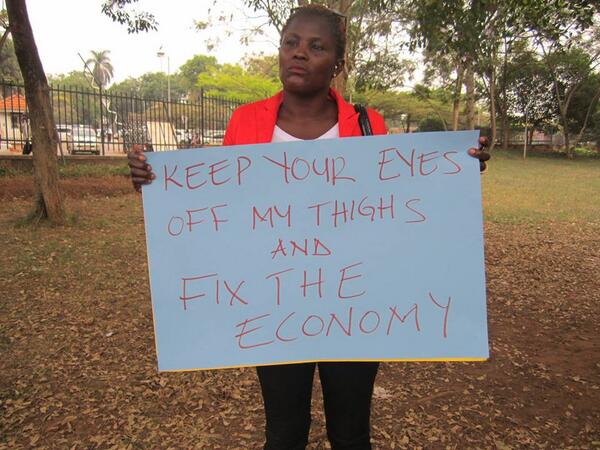
On Sunday, the BBC, via Twitter, began contacting Ugandan women and feminist bloggers, journalists and writers with the following invitation, “@bbcworldservice radio wd like to hold discussion Mon a.m. with Ugandan women about #SaveTheMiniSkirt. Are you interested?”
The Ugandan Minister of Ethics and Integrity has proposed a law that would outlaw `indecent dress’, only for women of course. This `anti-pornography’ law will somehow `protect’ women, deflect men from their `natural’ instincts, and generally return Uganda to a state of innocence it never knew. Nevertheless, the passage will be one of promised return.
On one hand, the Bill is a distraction. As Ugandan journalist Grace Natabaalo responded, “We have mini-hospitals that can’t cater for our needs, mini-roads with potholes, mini-funds for education. Why focus on miniskirts?” Writing of the misinformation campaign surrounding the Marriage and Divorce Bill in Parliament, Ugandan journalist Rosebell Kagumire might have been writing on the miniskirt ban as well, “However long it takes, the struggle for social justice will see a fruitful day. You may fool non-reading Ugandans for now but you can’t deny that it tells a lot about the country when 30 years down the road we are still stuck with a colonial marriage law! And if Museveni wants a pro-people law, it will have to threaten those in privileged positions whom the current law favours. Believe you me the changes required are not a threat to ordinary people suffering violence resulting from unresolved marital issues. It is not enough for those victims for MPs to say they are against the law. It is not enough to oppose! We need to hear you on what you think Uganda deserves!”
Believe you me, women suffering violence, including the threat of violence, do not feel protected by a ban on their clothing. Women know the ban on women’s clothing is never a ban on clothing. Instead, it’s an attack on women.
In opening this non-debate, Uganda joins quite a list this past year: India, Zambia, Kyrgyzstan, Indonesia, South Korea, Mexico, Namibia, Swaziland, Nepal, Cameroon, France, and the United States. And this is only a partial list. In the past year, no continent has been free of State assault, via clothing bans, on women’s bodies.
For example, in New York, police stop-and-frisk practices target transgender women. Transgender women, and especially transgender women of color, are stopped at high rates, under suspicion of engaging in sex work. What constitutes that suspicion? Cross dressing. What confirms the suspicion? Condoms. It’s a perfect vicious noose that binds New York to Yaoundé to Katmandu and beyond.
The charge, from New Delhi to New York, is always already prostitution. At the same time, the length of a woman’s hemline explains rape. That was the explanation in India, Indonesia, Namibia, and now Uganda.
I hope the BBC conversation will contextualize the Uganda Bill in the ongoing struggles for women’s rights, for the rights of sexual minorities, and the movements for democracy in Uganda. I also hope that the BBC discussants will remember that this assault on women’s integrity, autonomy, agency, sexuality, power, bodies is a global phenomenon, and that is precisely the mark of our times. Believe you me.
(Photo Credit: pbs.twimg.com)